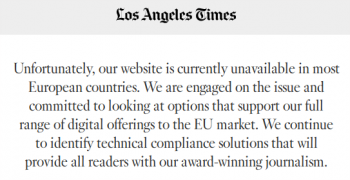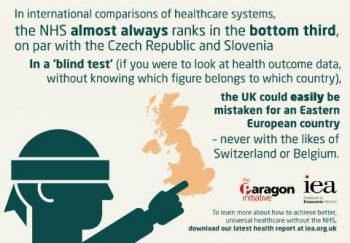We are developing the social individualist meta-context for the future. From the very serious to the extremely frivolous... lets see what is on the mind of the Samizdata people.
Samizdata, derived from Samizdat /n. - a system of clandestine publication of banned literature in the USSR [Russ.,= self-publishing house]
|
Thanks to Brexit fruit is going to be left to rot in the fields. How can we cope without a reliable supply of cheap foreign labour and zero-hours contracts to cover the seasonal summer work? All this will push the cost onto society in the form of more expensive grocery bills.
Meanwhile, those evil Capitalists at Amazon are exploiting cheap labour and forcing people to work zero-hours contracts to cover the seasonal winter work, pushing the cost onto society in the form of tax credits.
I clicked on a link to an article about food marketing failures and came upon a notice that due to GDPR, the publisher just could not be bothered dealing with people from Europe for now. It turns out the even the Los Angeles Times thinks people from Europe are too much of a pain in the ass to talk to.

If they can not cope, what chance does a small US-based pizza restaurant with an online ordering system have, having been told that they have to comply with GDPR in case any customers from the EU visit?
Things look set to get even worse for the Internet within the EU. But it is not just the EU. Amazon will stop shipping things to Australia because of a global sales tax. Trump seems very keen on tariffs. The UK does not appear to be in any hurry to turn into a small-state unilateral-free-trading nation after Brexit. In fact we are likely to have to choose between outright full-steam-ahead socialism and slowly-boiled-frog socialism at the next election.
Governments really do like their borders. As Guy Herbert says: The nation state is still our biggest problem.
Some farm employees kicked pigs and stabbed them with pitchforks. An organisation called Animal Equity who do undercover investigations with the aim of reducing cruelty to farm animals used hidden cameras to capture the evidence. They gave it to the press, who confronted the farm, who fired the employees.
Helen Browning, who owns an organic pig farm in Wiltshire, insists that consumers need to know more about where their meat is coming from so that customers can make informed choices in supermarkets.
She said: “You can see if something is organic. Ours are organic pigs and you can sometimes see free range or outdoor bred, but actually nothing tells you about perhaps the less attractive side, so nothing will tell you if pigs have been in farrowing crates or kept indoors.
“Most of us buy free range eggs now because it’s clearly labelled whether they have been barn reared, they’ve been in cages or they’ve been free range. We need the same for pigs.”
Co-op is the largest supermarket chain to promise to stop using pork from pigs that have been kept inside their whole life in its own-brand products.
That will come into effect from July and is something that only Waitrose is currently committed to.
The British Secretary of State for Environment, Food and Rural Affairs, Michael Gove, said:
What are you talking to me for? This has nothing to do with the state. Everything is working as it should. People who care about the welfare of animals took it upon themselves to investigate and convince other people that this is a bad thing. The farm has received negative publicity and will suffer in the marketplace unless it mends its ways, which it has started to do by firing the employees involved. And food retailers have identified a demand for meat from animals that have been treated more kindly and are working towards meeting it. The market works.
Now go away. My department only has two part-time employees and we have some disputes over field boundaries to advise people about so we are very busy.
Oops, sorry, wrong universe. He actually said that he has pledged to restore the UK as a leader in animal welfare.
This universe has finite resources, finite. If life is left unchecked, life will cease to exist. It needs correcting.
Avengers: Infinity War spoilers below.
→ Continue reading: Samizdata movie spoiler quote of the day
Writing in CapX, Chris Deerin argues that opposition to ID cards is out of date. He seems to agree that they may solve problems including terrorism and mis-treatment of immigrants. He suggests that government would be better if we did not need to leave the house to talk to it; that democracy would be better if we could vote online. He suggests that because some people are horrified by Facebook’s sharing of data while others happily tell Facebook everything, that we should all be happy to tell the government everything.
He suggests that because people under the age of 25 enjoy the convenience and fun of online services from private companies, that they should also enjoy being forced to sign up to a single unified government database too.
Not many in that generation would choose to return to an era of privacy if it meant giving up the treasures of their online existence. It seems faintly ridiculous that in such a climate we are reluctant to allow the state to jump on board.
He suggests that because people voluntarily hand over information of their choosing to companies even though those companies sometimes make mistakes and leak information, that they are silly to be nervous of being forced to hand over whatever information the government wants to be stored on a centralised government database. As if it is just the same thing.
The entire article is nonsense that ignores the fundamental difference between the state and private individuals: that we do not interact with the state voluntarily.
A 78-year-old man was arrested after he stabbed a burglar in his house. He was arrested on suspicion of grievous bodily harm. The burglar died and the man was then arrested on suspicion of murder. Later he was released on bail.
I can not find much to disagree with in Godfrey Bloom‘s assessment of the matter (though I know little of his views on other subjects), nor Karren Brady writing in The Sun (though I don’t agree with other things she has written there).
This exchange on Guido’s site sums up most of the possible arguments about this:
Happy Day (quoting Godfrey Bloom): What other country in the world would have arrested a 78 year old pensioner for defending his wife and defending his house in the middle of the night?
Greenacres: A civilized one. A man died, Police did a cursory investigation and released the suspect without charge at the earliest opportunity. The outcome is a tragedy for the pensioner and i’d do exactly the same as him if the situation was reversed but the circumstances of any death have to be investigated.
thinktheunthinkableuk: Investigate…yes. Question him……….yes. Get a statement…..yes. But was there any need to “arrest” him? Or lead him away in handcuffs? Or detain him in police custody for 2 days?
I would extend extreme benefit of the doubt to anyone in this situation. As Brady writes, he should have been “offered a cup of tea and a comforting arm around his shoulders” above all else. I think it should be possible to determine what happened in this sort of situation without arresting anyone.
The report on this incident in the Metro lists three other cases that may be worth further study.
Bloomberg is the only TV news channel I can stomach watching in the UK; it is the only one that is not instinctively leftist. I suppose if you are trying to provide a service that people will pay for to help them make financial decisions, a better standard of truth is required.
This morning they were very excited about Donald Trump’s threats to impose tariffs, especially now that (relative) voice-of-reason Gary Cohn has announced his resignation. They reported that the EU is threatening to respond to Trump by cutting off EU consumers’ noses to spite Donald Trump’s face.
Perhaps if we are lucky post-Brexit Britain will be a refuge of sanity, free-trade, and economic growth amongst all this madness.
Or perhaps, as one commenter on Bloomberg suggested, it is all bluster and this is just Trump negotiation tactics and it will come to nothing.
Jack White sings:
Every time that I’m doing what I want to,
Somebody comes and tells me it’s wrong.
Whenever I’m doing
Just as I please
Somebody cuts me down to my knees.
The song seems to be an ode to those who just want to be left alone, and a critique of those who think they are owed something by others. The quote marks are on the lyrics sheet with my LP, and are important.
“Stop what you’re doing
And get back in line!”
I hear this from people all the time.
“If we can’t be happy
Then you can’t be too!”
I’m tired of being told what to do.
It is a good song.
I recently played the computer game, Papers, Please. It is set in a fictional dictatorship that looks like the USSR. You play a man who is assigned by lottery the job of border agent.

At the start of each work day you are shown newpaper headlines which affect the border rules. A shortage of jobs might lead to a requirement for foreigners traveling for work to have a work permit, for example. There is a long queue and travelers come to your desk one by one. There is some dialog ranging from “hello” to an elaborate sob story. You look at the papers presented and make sure all the rules are followed, then decide whether to stamp then entry visa with “APPROVED” or “DENIED”. You get paid according to the number of people you check through the border in a limited amount of time and you can get fined if you fail to follow the rules properly. At the end of each work day you are presented with bills and must check off which ones to pay. You must always pay rent, but must choose whether to buy heat, food or medicine. You are also shown whether your wife, son, uncle and mother-in-law are cold, hungry or ill. You might decide, for example, to buy medicine for your son instead of food for your mother-in-law.
All this is presented in a point-and-click, drag-and-drop, retro-style indie-game interface with a distinctly Soviet look and sound design.
Tension comes from trying to work quickly without making any mistakes. It’s easy enough to check that the passport has not expired and the work visa is valid, but not notice that the name on the work visa does not match the name on the passport. Rules get increasingly more complicated as the game progresses with more documentation being required and more information to check.
The game also gives you some moral agency. One man with valid papers says his wife is in the queue, but there is a minor discrepancy with her papers. Do you separate the couple, or take pity on them? Another woman says she will be killed if she is sent back home. Another begs you not to allow a certain man through as he is planning to sell her into prostitution. You can break the rules about twice per day and get away with it, but any more and you will get fined. Breaking the rules on purpose increases the risk of being fined for making a mistake.
All this means that while you might start with good intentions, before long you are weighing the lives of your family against the plight of the travelers. On my first play-through I sent various travelers to their doom to save my ill son, but ended up in jail when I decided to deny access to the pimp whose papers were valid, got fined, and could not afford the rent.
It’s a fun game and has an interesting lesson about how people are compromised by inhumane systems.
See also: Papers, Please cosplay and the short film.
Whenever I have attempted to discuss health care, I am always told about how the US health system fails people. I am sure that this is some combination of untrue (my own experience of US health care was walking in unannounced, paying $100 and being seen and fixed straight away) and unfair. US health care is not wholly private or even very free-market at all, and suffers a high level of regulation. But I do not understand enough about the details.
I occasionally hear good things about other health care systems, such as Australia’s method of having people pay and then possibly having the government refund them. While I can understand that it will be hard to convince people that anarcho-capitalist health care is best, it is interesting in the UK that no changes to the structure of health care at all will be considered. Private companies must not be allowed to make a profit! Such profit can only be gained from killing patients.
However the IEA have recently made an interesting strategic decision to counter-attack the knee-jerk reaction that the only alternative to the NHS is US-style health-care. What if the NHS and the US system are both weird and there are other sane and functional systems in the world? Kate Andrews has appeared on the BBC pointing this out. Guido covered it. Kate Andrews wrote a piece for the Spectator. All this is to publicise the IEA report Universal healthcare without the NHS.
One thing they keep pointing out is that the NHS ranks in the bottom third of the world’s health care systems in terms of outcomes. That will need a lot of repeating if anyone still thinks it is the envy of the world.

It is also, perhaps, a much more effective strategy than attempting to convince people of the benefits of free markets up front. “Let us try to learn something from nice country X” does not require breaking down as many mental barriers as “please abandon a lifetime of carefully cultivated opinions about the unfairness of capitalism”.
A hundred and fifty years ago it took twenty-five men to all day to harvest and thresh a ton of grain. With a modern combine harvester, a single person can do it in six minutes. In other words, it contributed to a 2,500-fold productivity increase.
– Johan Norberg writing in Progress: Ten Reasons to Look Forward to the Future.
Youtuber JeffHK works on container ships and his channel is very useful when one’s children ask questions about how stuff gets moved around the world, not to mention just fascinating in general.
One of his videos lists the advantages of working at sea. Paying less tax is among them. He expresses amazement that the income tax rate in the UK can be as high as 45%.
I heard in the UK if you earn more than 151 thousand pounds a year you get taxed 45%. That’s crazy! That’s half of what you earned; your blood, sweat and tears going into someone else’s pocket.
Another video lists disadvantages. Among them: regulations.
Every year new regulations come into force and sailors, we have to fetch out money for endorsements on new certificates, new licenses, more paperwork, more checklists, new codes, new safety procedures, new environmental laws […] We are paying to get certified for what we have been doing for hundreds of years. It’s almost like the government or marine schools are milking us for money. There’s no end to that.
But never mind the politics. Don’t miss the Suez Canal timelapse, the container loading explanation, or the ship tour. The production is of a high quality with good editing and judicious use of drone footage.
|
Who Are We? The Samizdata people are a bunch of sinister and heavily armed globalist illuminati who seek to infect the entire world with the values of personal liberty and several property. Amongst our many crimes is a sense of humour and the intermittent use of British spelling.
We are also a varied group made up of social individualists, classical liberals, whigs, libertarians, extropians, futurists, ‘Porcupines’, Karl Popper fetishists, recovering neo-conservatives, crazed Ayn Rand worshipers, over-caffeinated Virginia Postrel devotees, witty Frédéric Bastiat wannabes, cypherpunks, minarchists, kritarchists and wild-eyed anarcho-capitalists from Britain, North America, Australia and Europe.
|






